- Home
- Mark Zubro
Pawn of Satan Page 10
Pawn of Satan Read online
Page 10
Paul let it go. If it were a teenage secret or a teen tragedy or a teen love affair or some other storm in his son’s life, he’d have to wait to hear about it.
“Did your brother apologize?”
“Yeah. I feel bad for him lots of times.”
“You know he doesn’t like pity.”
“I know. I don’t show it to him. I don’t say it to him, but I feel bad for him. I wish I could make it so he wouldn’t have to be in a wheelchair.”
Every day since the boy was born, Paul had felt the same thing.
Sunday mornings were quiet newspaper reading time. Brian read the New York Times Sunday sports section as well as going out and buying the final editions of the Chicago papers so he’d have the most up to date articles and in depth coverage especially of local high school teams.
Jeff did the New York Times crossword puzzle. In ink. Much to his brother’s annoyance. Although this Sunday before starting on the puzzle, Jeff completed one of Brian’s weekly chores. The youngster dusted all the downstairs, then vacuumed. Paul was glad to see that Brian, without being asked, helped his younger brother by moving the larger pieces of furniture so he could vacuum under them. He liked watching the boys work together.
Ben concentrated on the Week in Review section and the front page. Paul started with the Style and Travel sections. He still read the entirety of all the same-sex marriage announcements every week. Eventually, he and Ben and Brian would switch sections of the paper. Jeff clutched onto the puzzle and stayed close to his Internet connection sometimes for hours in his quest for completion.
They’d resolved the going to church issue a few years before. The two boys had asked to speak with Paul and Ben together. They’d presented theological, philosophical, and logistical arguments.
Paul wound up chatting with Mrs. Talucci about her attendance. She’d been feuding with various parish priests and pastors for years. She was too liberal for them. But on that bright, humid, July, Sunday morning, she’d patted his cheek and said, “I don’t go because I don’t believe in imaginary invisible beings in the sky who can angrily or benevolently influence our lives.”
“The boys talked to you.”
“Some time ago. Jeff especially expressed lack of belief. He was looking for an excuse for years to stop going to church. When Brian stopped going, he saw his opening. Brian is a sweet, smart boy. Jeff is smart and sensitive.” Her smile widened. “But you know that.”
“Why didn’t they tell me they talked to you?”
“You could ask them that.” She smiled. “I’m afraid I corrupted your sons.”
“Who better?” Paul said. “At least you were there for them. Thank you.”
“My dear, that was just religion. You’re there for them as their dad. So is Ben. They love you both.”
When he was younger, Paul himself hadn’t made the break with the church he’d grown up with. As an adult, he decided it wasn’t an issue worth fighting his kids about. And the need for belief in a supreme being, he now found childish.
So they spent Sunday mornings quietly.
Before he left for work just after noon, Paul and Ben met in their bedroom.
Ben said, “Kids seem normal. Has Brian been into his secret stash?” Several years ago, Paul had found the box with Brian’s old baseball gloves, souvenirs, baseballs, and trophies in the garage. At the bottom in an old cigar box was Brian’s secret stash.
Of candy bars.
Brian never mentioned their existence. If the boy felt a need to cheat on his self-imposed health food regimen, Paul and Ben agreed they didn’t need to bring it up. They both knew that the supply got depleted when the boy was under stress.
Paul said, “I checked a few minutes ago. Nothing in it has passed its expiration date so it’s reasonably fresh like it always is. It looked the same as it did after he got over the break up with Mary Ann what’s-her-name a few months ago.”
“That was serious.”
“I know the supply was down a lot then, and way down after they lost the baseball championship last year. Last time I looked it was full. I haven’t checked it in a while.”
“Me either.”
Ben said, “It’s down a lot now.”
“So he could have been munching for months.”
“He’s pretty faithful on his health food diet. I just don’t check it that often.”
“I never felt the need.”
“Level of candy as a sign of a teenager’s state of mind?”
“Good as any. Better than some.”
“If it’s accurate.”
“It’s another indicator that tells us we need to be watchful.”
“So what do we do?”
“Worry.”
Ben sighed. “Like every parent ever.”
FIFTEEN
Sunday 1:30 P.M.
Outside the front of the station, they saw television trucks from every local and national television network and a clot of bored reporters. Inside they ran into Molton. Fenwick said, “I thought this was your day off.”
“The command structure never gets days or nights off. This should not be a surprise to anyone. I’ve been inundated with shit on this Bishop case. Odd shit has hit the fan.”
“Odd shit?” Fenwick asked.
“Do you really want to know?”
“Kind of not,” Fenwick admitted.
“Besides the usual, the word I have is that your buddy, Bishop Pelagius, and his minion, Vern Drake, had a meeting with the mayor.”
“That quick?” Turner asked. “They were only here last night.”
Molton shrugged. “Shit happens.”
Fenwick said, “I thought Drake and the mayor hated each other.”
“They do.” Molton chuckled. “It might have been kind of funny to be at that meeting. No, the problem is too many idiot politicians in this city, this time mixed with demented clergymen. I’ll handle it. Do your jobs although it would help a lot if you caught a murderer sooner rather than later.” He grinned. “But I guess that’s true of all these cases.”
Fenwick asked, “What about getting a subpoena for church records or talking to the Cardinal?”
Molton sighed. “Both are hopeless.”
Fenwick emitted an angry growl.
Molton said, “You can growl. You can turn into a grizzly bear. You can bring a pride of lions or an angry polar bear in here and destroy the place. You are not going to interview the Cardinal Archbishop of Chicago. You can rage about it. You can fight about it. And yes, I’ve raged and fought about it already. Do you really want to question my ability to fight on your behalf?”
Head shakes from Turner and Fenwick.
Molton continued, “Don’t worry about those assholes. You’ll solve it. You know I have total faith in you guys. There’s always obstacles in cases. You can beat the Cardinal and the Church if you have to.”
After talking with Molton and despite his assurances, they knew the pressure was on, the media was going nuts, and there wasn’t a hurricane, national tragedy, or international incident to distract the media from a dead bishop.
At their desks both Fenwick and Turner had phone messages that told them the Crime Scene personnel would meet them at two at the site of the murder and give them the results of what they had.
Before they left, Turner called the Amarillo, Texas, police department about the accuser who had died in the car accident. The detective he spoke to said there had been nothing suspicious about the death.
Turner also called the Medical Examiner. “He was not drugged. The cloth in his mouth was a hanky of the kind that is sold in a thousand stores around the country. It had only the victim’s DNA. I found traces of foreign residue on his jacket cuffs and on the legs of his pants. He was bound with tape which the killers took with them, possibly to avoid leaving fingerprints or some other thing that would be on the tape which would lead to identifying the killer or killers.”
Turner thanked him.
They got into their decrepit
unmarked car and headed to Willow Street. They parked at the dead end next to the Crime Scene van. Milo, the same hot, youngish guy, exited his vehicle. He said, “I have secret forensic evidence that shows who the killer is.”
“Really?” Fenwick asked.
“No. I save that for poorly written cop shows on television.”
“Asshole.”
“I’m the asshole who has the forensics degree and training and you’re the asshole who doesn’t. So we’re even.”
“Does that make sense?”
“Who cares?”
Milo looked satisfied, as if he’d won a round of one-up-man-ship with Fenwick. Turner wasn’t interested in keeping score.
Turner asked Milo, “What have you got?”
Milo said, “It took us quite a while to get all this sorted. The actual site where the body was found is a little hard to get to. That said, it has been used as a trysting place for all kinds of illicit stuff probably for many years. We got traces of drugs. We got condoms. We got sexual residue. The usual shit you’d find in a hidden urban area. And no, none of the residue we found so far related to your case. Or at least probably not much help.”
He pointed to the yet-to-be towed victim’s vehicle.
“First, we examined that. We have the victim’s prints on the steering wheel. His are clear. The others in the car are mostly blurred or partials. We ran what we got through the system. No matches.”
Fenwick said, “So he came here in it willingly.”
Milo said, “I got nothing on that either way. The registration in the glove compartment said the car belonged to something called the Sacred Heart of Bleeding Jesus Order. Your bishop was not cavorting with someone in the criminal justice system who was also a passenger in this car. The back seat had some prints, none of which were the Bishop’s or of anyone on file.”
Milo swept the ground on the street with a laser pointer. “We have numerous indistinct prints from numerous automobiles. Nothing that we found seemed useful.”
He led the way down the quiet street toward the junkyard. “You know who actually owns this land?” Milo asked.
The detectives shook their heads.
Milo smiled. “Well, I’m a step ahead of you guys on that. The archdiocese of Chicago owns everything for a hundred yards in either direction up and down the river and up to the end of the junkyard property line. The actual junkyard property, however, a narrow strip of land, is owned by the Sacred Heart of Bleeding Jesus Order.”
Fenwick said, “Some entity of the Catholic church owns this side of the river?”
“I had my guys check the records this morning. Wasn’t hard to find. It’s public knowledge. This much real estate in this area would be worth a great deal.”
The detectives nodded. Fenwick said, “They sell this land to developers, we’re talking millions, tens of millions, hundreds of millions.”
Turner said, “But does that knowledge get us closer to the killer?”
The other two shrugged. They all knew that proximity did not necessarily point to a criminal or mean a conviction.
Milo continued to explain as they arrived where the body had been found. “We don’t have an access point. We don’t know how they got in. There are certainly places where they could have climbed over, but again, we’ve got no evidence that your corpse was at any of them. And if you go far enough up or down the river, there are places that show evidence that people have used them to gain entrance, but none of that evidence relates to your case, so far.”
Turner said, “So one person could have climbed over or gotten in somewhere up or down the river then gone back and unlocked the gate, but you’ve got no forensics on that?”
“Nope. Same with the undergrowth leading to the scene. So far we haven’t found evidence that shows what your corpse did or didn’t do before he became a corpse. We haven’t found anything new at the crime scene itself. And half the planet could have used this area for trysting. We’ve got all kinds of deteriorated DNA and semen. What little we could get from the small bits that were still viable was not from anyone in the system or your victim.”
Fenwick let out an enormous belch. “I love no clues.”
“Anything on the fire pit?” Turner asked.
“Great news. It’s the only thing in here that I can say with reasonable certainty, had absolutely nothing to do with your murder.”
Back on the dead end street, Fenwick said, “A depressing lack of forensics.”
“Yep.”
Turner phoned Sanchez, who said, “We got nothing on the neighborhood canvass. The few people who were even around this morning claim to not have been here at all yesterday or the night before. We started on all the boats in the harbor and the tour boats. Plus we’ll talk to all the employees of the businesses up and down the river. Some of that will have to wait until Monday. If we get anything from them, I’ll give you a call.”
Next they stopped at the condo. As they had asked him to the night before, Waldin had assembled the rest of the staff. This time they already knew about the murder. None was a studly young man like Gravis and none even hinted about, much less admitted to, servicing Kappel. Nor did any of the help admit to noticing strange young men going to the Kappel condo.
The doorman who the neighbor Loretta Eisenberg said was on duty when the “furtive” man appeared was Robin VanSchouwen.
“Furtive? I like Mrs. Eisenberg although she’s a little cheap with her tips. She sees the world coming to an end every five minutes. Every stranger is furtive and dangerous to her. I just kind of nod and say yes to anything she says, but I don’t pay much attention.”
They checked the other neighbors. They could add nothing to what they knew already.
They called forensics. They’d examined the wallet and other personal items and found nothing suspicious.
Back at Area Ten they trudged down to see Fong. He was playing chess on level 19 on his computer. Fong smiled when he saw them. “I managed to get phone records from the number.” He handed them a sheaf of papers. “I just got done a few minutes ago. I was waiting for you to come back to deliver them.”
The detectives glanced at the list of numbers. “You know who these people are?”
Fong handed him another list of names. They’d go over them at their desks.
Fenwick asked, “You got anything on Kappel’s financials?”
Fong handed them a printout of Kappel’s credit card purchase records for the last twelve months. He’d made two copies. His printer tended to work more faithfully than the one the detectives had available to them.
“Anything stand out to you?”
“Nothing special, but you’ll get some notion of his life from what you’ve got.”
At their desks they perused the phone records first. They glanced back and forth from numbers to names. Fenwick started from the first of April, Turner from the last call made.
Turner said, “The last three calls were to Tresca. One that afternoon at four-seventeen then again at nine-sixteen and the last one at nine-fifty-six. The final two lasted a minute each.”
“We gotta talk to Tresca. I think we’ve got calls to the Abbot, calls to the Cardinal. They were his bosses, friends or enemies, but constant contacts.”
“And they aren’t talking to us.”
“Not yet.”
Turner dialed Tresca’s number. He got the recording that said the inbox was full. He tried several of the other numbers listed. He got voice mail on all of them. He reported to Fenwick. “I called four numbers connected with religious people, the Abbey, the Cardinal. They aren’t answering.”
“It’s a conspiracy, by members of the Catholic church. Now there’s an unusual thought.”
They hunted through the credit card statements. Turner said, “We got his travel records and meals. There’s a month’s worth in Key West for all of January. There’s pay-for sites where he could watch porn on the internet.” Turner double checked the sites. “These are all just video or picture gallery s
ites. None of them is an escort site.”
“Doesn’t tell us who the killer is.”
“Nope.”
“He watched porn and paid for escorts.”
“He was horny a lot?”
“A horny bishop?”
“Bishops don’t get horny?”
“No idea.”
SIXTEEN
Sunday 2:30 P.M.
They began interviews from the list Turner had compiled the night before with those who might be most negative about Kappel and/or the Sacred Heart of Bleeding Jesus Order. The first name they had was Xavier Garch. He was the head of the theology department at Pope Saint Agatho University. Like Loyola and DePaul Universities, the other large Catholic institutions of higher learning in the area, it was an urban university. Garch lived on Sheridan Road north of Hollywood.
They parked in the tow zone in front of the high rise at the corner of Granville and Sheridan. Garch’s building was forty stories and was your basic glass and steel box with little to distinguish it from other glass and steel boxes.
The doorman called up. Garch was home. They took the elevator to the thirty-fourth floor.
In the elevator Fenwick asked, “Who was Pope Saint Agatho?”
Turner said, “That’s why they created Google so you’d have an outlet for your useless questions.”
“You could have just said look it up yourself.”
“Look it up yourself.”
A slender man smoking a cigarette answered the door. Turner thought he was in his late fifties. They showed him identification. He invited them into a room with bookshelves filled with books from floor-to-ceiling on three walls. The fourth wall was floor-to-ceiling windows with a view of the lake.
A large area rug sat in the middle of a hardwood floor. On it were four black leather armchair recliners. Each chair had its own pole reading lamp and small table with a pile of three or four books and an ashtray on each. The place stank of stale cigarette smoke.
Xavier Garch invited them to sit. He spoke in a high, reedy voice. “You’re here about Timothy Kappel.”
“Why would you presume that?” Fenwick asked.
“I saw the news on the Internet. He was a shit to the university, and he and I had clashes. Why wouldn’t you be here?”

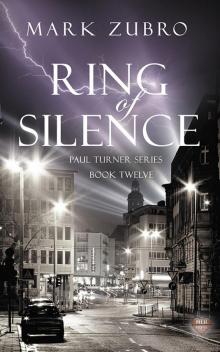 Ring of Silence
Ring of Silence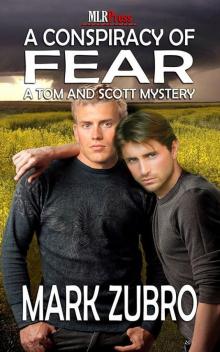 A Conspiracy of Fear
A Conspiracy of Fear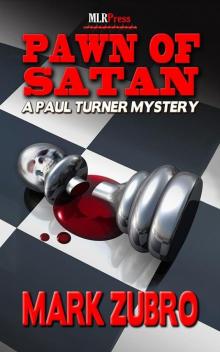 Pawn of Satan
Pawn of Satan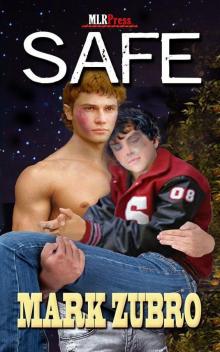 Safe
Safe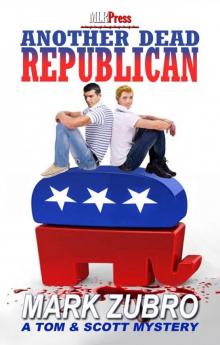 Another Dead Republican
Another Dead Republican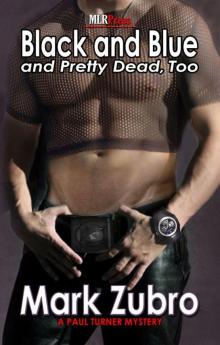 Black and Blue and Pretty Dead, Too
Black and Blue and Pretty Dead, Too Alien Home
Alien Home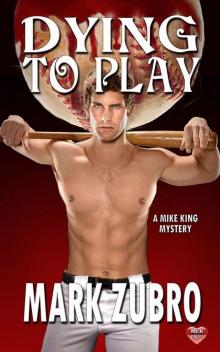 Dying to Play
Dying to Play Alien Victory
Alien Victory